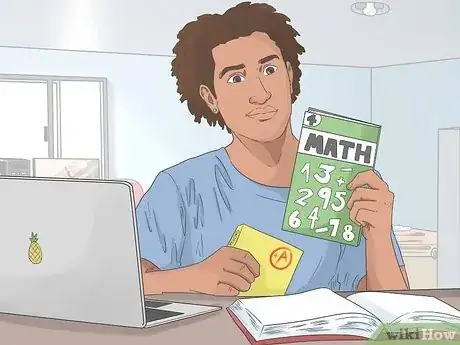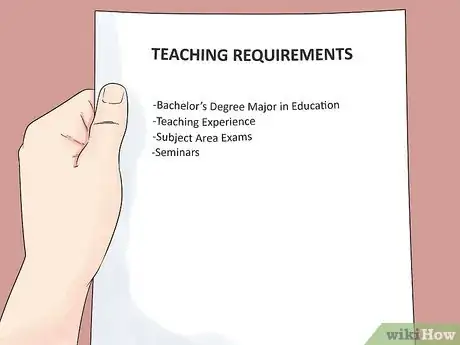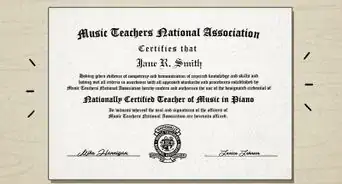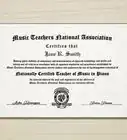This article was co-authored by AdoptAClassroom.org. AdoptAClassroom.org is an award-winning nonprofit that provides funding for K-12 teachers and schools throughout the US. Through this funding, they have reached over 4.5 million students. Today, they hold a top, 4-Star rating from Charity Navigator.
There are 10 references cited in this article, which can be found at the bottom of the page.
This article has been viewed 62,577 times.
Choosing a subject to teach is an important decision for aspiring teachers. Key considerations prior to making a decision include topic interests, age group preferences and employment opportunities. Researching available teaching options and speaking to experienced teachers can help in making a well-informed decision. Understanding the licensing and certification requirements in advance also assists in making a choice.
Steps
Identifying Your Interests
-
1Reflect on what subjects interested you the most as a student. Chances are, whatever subject interested you then will be just as fun to teach. Whatever subjects bored you are probably poor choices for you to consider teaching.
- Which subjects did you have good grades in?
- What subjects did you have memorable projects in?
- Do you remember your most inspiring teachers? What did they teach?
-
2Ask yourself which topics you would study on your leisure time. When you’re not working or not in school, what you do for leisure is a good indication of what you might want to teach. Consider the following:
- Do you build or fix things for fun? Think about science or something similar.
- Do you read about history or visit historical sites around your community? Consider being a history or social studies teacher.
- Do you read fiction and other types of literature? You might consider a career as an English teacher.[1]
Advertisement -
3Understand what subjects you’re the best at. While general interests and curiosity are important when it comes to teaching, you need to consider what you’re the best at. Whatever subjects you excel at the most will likely be the ones in which you’ll be able to offer the most to students. Consider the following:
- If you are a natural writer, you might teach language arts.
- If intrigued by the historical perspective on social issues, you might teach history or social studies.
- If you enjoy working with numbers and problem solving, think about math or science.
-
4Ask for input from experienced teachers. Those who know the most about teaching, both grade levels and subject areas, are teachers who have taught a long time.
- A science teacher might enlighten you on the challenges and joys of teaching the subject.
- A language arts teacher in a college can share the struggles of adults in a remedial language arts class and strategies used to accelerate learning.
- An experienced middle school social studies teacher might direct you toward teaching high school or college depending on your interests.
- You might gain valuable contacts for later in your teaching career.[2]
-
5Visit schools to observe classes. Watching teachers and learners in the classroom is one of the best ways to determine a subject and age group to teach. You'll also be able to observe how specific subjects are taught at specific grade levels.
- You might find that you possess the enthusiasm and energy of preschool teachers or thrive on the difficult questions asked by high-achieving college students.
- You might also find that you enjoy one subject better than another.
- You might learn that being a middle school social studies teacher is drastically different than you originally thought.
-
6Become a substitute teacher. If you already have an associate’s degree or a bachelor’s degree, chances are you’re qualified to be a substitute teacher for K-12 in many school districts. Spending some time as a substitute teacher will enable you to take command of classrooms for the entire spectrum of grade levels. If you’re able to have such an opportunity, you’ll be much more equipped to decide what grade level and, relatedly, what subjects you want to teach.[3]
Examining Your Preferences for Different Age Groups
-
1Conduct a thorough observation of grade levels. Ask permission to visit one class each day for a week to observe progress across a longer duration. Visit all grade levels to gain a comprehensive view of the needs of each age group. You'll not only learn about different age groups, but you'll see how different subjects are taught to them.
-
2Determine if your desire to teach advanced topics will help rule out certain age groups. As anyone who has graduated from the K-12 experience can tell you, different age groups study different parts of subject areas in math, science, English, and other subjects. If you're committed to a certain subfield of your specialty, you need to consider what age group is appropriate for that area.
- Prospective science teachers need to consider whether they want to teach general science or a subfields like chemistry, physics, or astronomy. These subfields are usually reserved for high school and college.
- Prospective math teachers need to consider whether they want to teach basic arithmetic or a subfield like algebra, geometry, or calculus. These subfields are usually reserved for middle school and above.
- Prospective English teachers need to consider whether they want to focus on basic principles like grammar or if they'd prefer to focus on literature. In many districts, teachers won't really be able to focus on literature until at least middle school, and will have to wear many hats as an English teacher. So make sure to do your homework before deciding.
-
3Decide if you’re interested in working with elementary school age students. Teaching elementary students will largely influence the type of material and the type of teaching you’ll be engaging in. Teaching elementary students offers various rewards and challenges that other age groups do not and will greatly influence how you approach subject matter. If you pick teaching at the elementary level, you'll be working with young children, so you’ll need to be geared toward handling age-related issues.
- Working with elementary students often requires teaching numerous subjects, so depending on age level, you may not be able to focus on just one subject area.
- If you enjoy working with young children and are equally knowledgeable about the fundamentals of math, reading and writing, grade school teaching may be for you.
- If you are interested in focusing on basic concepts, elementary teaching might be right for you.
- If you are interested in being part of a more nurturing environment and helping students transition to a new environment, elementary teaching might be right for you.[4]
-
4Think about teaching middle school. Middle school is really the “middle” ground between elementary and high school. This is the best of both worlds if you want to provide a more nurturing environment, but also want to focus more on a specific subject area.
- As a middle school teacher, you’ll be able to focus much more on a specific subject area, but you’ll still also be dealing with a lot of nurturing and behavior supervision.
- Your students might be a little more unpredictable than high school students, as many will begin going through puberty.
- Students will begin to seem more like adults, but will still need more individualized attention like elementary students.[5]
-
5Decide on whether you want to teach high school. High school students are, of course, the most like adults. But teaching high school students also comes with a unique set of problems and opportunities. Consider the following:
- You’ll be able to teach much more complex concepts.
- Behavior issues could offer more challenges, as students are almost adults.
- Students will need less individualized attention, but will still demand a high level of supervision.
- Although your students will be older, you will still need parent involvement from time to time.
-
6Consider teaching college-aged students. Teaching college-aged students is drastically different than many of the other types of teaching. Students are now considered adults, and as a result, your role as a teacher will be much different. As an “instructor” or “professor” you are an advisor, mentor, and a purveyor of knowledge. Consider the following:
- You’ll focus on complex subject concepts.
- You’ll seldom have to worry about behavior problems.
- You’ll have little to no interaction with parents or guardians.[6]
Exploring Employment Opportunities
-
1Consider where you live. Your geographical location is extremely important in understanding employment opportunities. Depending on a variety of factors, certain areas might have a deficit or surplus of teachers in certain subject areas. Depending on other factors, it might be very difficult to secure employment in any subject area.
-
2Investigate critically-needed subject areas. If concerned about employment prospects, researching the job market in advance will assist in making a sound decision. The school districts near you may be in need of math teachers or bilingual educators. Choosing to become trained in multiple topics or training extensively in one academic subject are potential outcomes of a job market search.
- Some districts provide money for their teachers toward training in critically-needed areas.
- Some districts and states will assist you in paying off your students loans if you're in a critically-needed subject area.
- There are some programs, like Teach for America, that will help train and place you in areas where teachers are needed in certain subject areas.[7] [8]
-
3Investigate certification requirements for teaching K-12 in your area. You need to be aware of any requirements for employment ahead of time. Visit your district's website or call their main office, and they'll be able to provide you with a list of requirements. You may be required to:
- Complete a particular type of degree, based on the subject or age level you might teach.
- Gain teaching experience.
- Take specific subject area exams to become certified in your topic of choice.
- Requirements vary greatly depending on your state.[9]
-
4Research degree requirements. After pinpointing a subject and grade level, consider the degree(s) you will need to teach the subject. This might vary on the state or municipality you live in.
- Elementary teachers need a bachelor’s in education from an accredited teacher preparation program.
- Middle school teachers might need a bachelor's in education from an accredited teacher preparation program.
- High school teachers might not need an education degree, but are often required to have a minor in education and have been enrolled in a teacher preparation program.
- College professors need at least a master’s degree, and depending on the subject, might need a doctorate to be competitive.
- Read the list of courses you must take to satisfy the degree, along with the course descriptions, to be sure that the topics hold your interest.[10] [11]
-
5Browse employment notices. Browsing district employment pages or other websites will give you a very good idea of what subject areas might provide the most opportunity for you in any given area. Take a little time to acquaint yourself with the demand side of the equation before you make any decision.
- Take a look at school district websites to see what subject areas are in demand and if there are any incentives for teachers in certain subject areas.
- Browse internet job websites to see if private schools are hiring certain subject areas more than others.
- Consider contacting independent school placement firms to see if they can give you an idea about what schools are looking for in terms of subject area teachers at any given time.[12]
References
- ↑ http://www.teachingdegree.org/2012/11/07/how-to-decide-what-grade-level-to-teach/
- ↑ http://www.teachingdegree.org/2012/11/07/how-to-decide-what-grade-level-to-teach/
- ↑ http://www.teachingdegree.org/2012/11/07/how-to-decide-what-grade-level-to-teach/
- ↑ http://www.teachelementary.org/top-10-reasons-teach-elementary-school/
- ↑ http://teach.com/where/levels-of-schooling/middle-school
- ↑ http://www.smu.edu/Provost/ALEC/NeatStuffforNewStudents/HowIsCollegeDifferentfromHighSchool
- ↑ http://www.topeducationdegrees.org/faq/what-subject-should-i-teach/
- ↑ https://www.teachforamerica.org/
- ↑ https://www.teach.org/teaching-certification
























-Step-15.webp)



















































